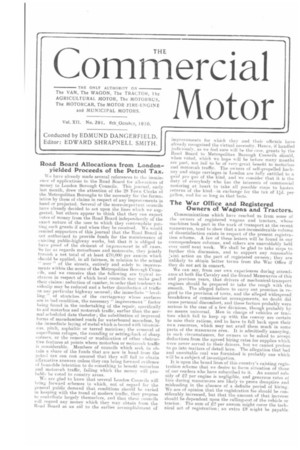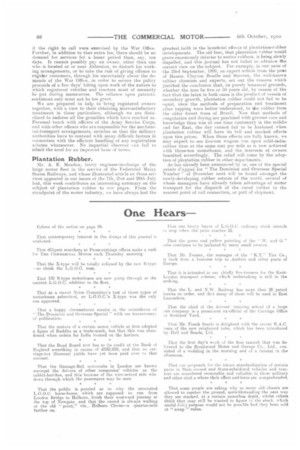Road Board Allocations from Londonyielded Proceeds of the Petrol Tax.
Page 1

Page 2

If you've noticed an error in this article please click here to report it so we can fix it.
We have already made several references to the imminenee of applications to the Road Board for allocations of money to London Borough Councils. This journal, early last month, drew the attention of the 28 Town Clerks of the Metropolitan Boroughs to the necessity for the formulation by them of claims in respect of any improvements in hand or projected. Several of the more-important councils have already decided to act upon the lines which we suggested, but others appear to think that they can expect votes of money from the Road Board independently of the exact nature of the uses to which they contemplate putting such grants if and when they be received. We would remind supporters of this journal that the Road Board is not authorized to provide funds for the maintenance of existing public-highway works, but that it is obliged to have proof of the element of improvement in all cases. So far as regards motorbuses and motorcabs, they jointly furnish a net total of at least £70,000 per annum which should be applied, in all fairness, in relation to the actual " user " of the streets, entirely and solely to improvements within the areas of the Metropolitan Borough Councils, and we conceive that the following are typical instances in respect of which local councils may make good their claims : reduction of camber, in order that tendency to sideslip may be reduced and a better distribution of traffic on any particular highway secured ; the inunediate " levelling " of stretches of the carriageway whose surfaces are in had condition, the necessary " improvement' factor being found in the undertaking of the repair, specifically to aid motorbus and motoreab traffic, earlier than the normal scheduled date therefor ; the substitution of improved forms of macadamized roads for waterbound macadam, by the immediate laying of metal which is bound with bituminous, pitch, asphaltic or tarred matrices; the removal of superfluous refuges, the rounding or setting-back of sharp tairners, or the removal OT modification of other obstructive features at points where motorbus or motorrab traffic is considerable. Members of councils which seek to obtain a share of the funds that are new in hand from the petrol tax can rest assured that they will fail to obtain affirmative answers unless they can bring forward evidence of Lena-tide intention to do something to benefit motorbus and motorcab traffic, failing which the money will probably be voted to country areas.
We are glad to know that several London Councils will bring forward schemes to which, out of regard for the general public demand that conditions should lie varied in keeping with the trend of modern traffic, they propose to contribute largely themselves, and that these councils will regard any money which they may obtain from the Read Board as an aid to the earlier accomplishment of
improvements for which they and their officials harealready recognized the virtual necessity. Hence, if handled judiciously, as we feel sure vill be the case, grants by the Road Board to Metropolitan Borough Councils should, when voted, which we hope will be before many months arc past, not fail to be of very-great benefit to motorbus and motorcab traffic. The owners of self-propelled hackney and stage carriages in London are fully entitled to a quid pro quo of the kind, and we consider that it is the duty of everybody who has the interests of commercial motoring at heart to take all possible steps to hasten returns of the kind—in exchange for the tax of 10. per gallon, and for so long as that lasts.
The War Office and Registered Owners of Wagons and Tractors.
Communications which have reached us from some of the owners of registered wagons and tractors, whose. maehines took part in the work of transport at the recent mameuvres, tend to show that a not-inconsiderable volume of dissatisfaction exists in respect of the present registration scheme. A. few of these letters will be found in our correspondence columns, and others are unavoidably held over until next week. We shall be glad to take steps to, further this discussion, and to support any reasonable.
action on the part of registered owners; they are unlikely to obtain better terms from the War Office if they do not act in concert.
We can say, from our own experiences during attendance at both the Cavalry and the Grand Manceuvres of this and previous years, that drivers of mechanical-transport engines should be prepared to take the rough with the smooth. The alleged failure to carry out protnises in regard to the provision of tents, and the alleged widespread' breakdown of commissariat arrangements, no doubt did cause personal discomfort., and these factors probably were serious in the case of a few divisions, though probably by no means universal. Men in charge of vehicles or tractors which fail to keep up with the convoy are certain to miss their rations, and to have to fall back upon their own resources, which may not avail them much in some parts of the manceuvre area. It is admittedly annoying,. in such circumstances, for owners to he asked to acceptdeductions from the agreed hiring rates for supplies which were never served to their drivers, hnt we cannot profess to go into matters of detail here. The allegation that had and unsuitable coal was furnished is probably one which. will be a subject of investigation.
It is upon the broad lines of this country's existing registration scheme that we desire to focus attention of those of our readers who have subscribed to it. An annual sub sidy of per engine is negligible, and generous rates of hire during manoeuvres are likely to prove deceptive and misleading in the absence of a definite period of hiring. We are of opinion that the registration fee should be considerably increased, but that tho amount of that increase should be dependent upon the calling-out of the vehicle or tractor. The sum of £2 per annum might cover the technical act of registration ; an extra a might be payable if the right to call were exercised by the War Office. Further, in addition to that extra fee, there should be no demand for services for a leaser period than, say, ten days. It cannot possibly pay an owner, other than one who is located at or near Aldershot, to disturb his working arrangements, or to take the risk of giving offence to regukir customers, through his uncertainty about the demands of the War Office, in order to secure the paltry proceeds of a few days' hiring upon work of the nature to which registered vehicles and tractors must of necessity be put during manceuvres. The reliance upon patriotic sentiment only must not be too great.
We are prepared to help to bring registered owners together, with a view to their obtaining more-satisfactory treatment in these particulars, although we are disinclined to endorse all the grumbles which have reached us. Personal touch with officers of the Army Service Corps, and with other officers who are responsible for the mechanical-transport arrangements, satisfies us that the military authorities have to contend with many difficult factors in connection with the efficient handling of any registration scheme whatsoever. No impartial observer can fail to admit the need for an improved basis of terms.
Plantation Rubber.
Mr. A. E. Meaden, lately engineer-in-charge of the large motor fleet in the service of the Federated Malay States Railways, and whose illustrated article on those services appeared in our issues of the 7th, 21st and 28th July last, this week contributes an interesting summary on the subject of plantation rubber to our pages. From the standpoint of the motor industry, ee have always had the greatest faith in the beneficial effects of plantation-rubber developments. The old fear, that plantation rubber would prove enormously inferior to native .rubbers, is being slowly dispelled, and this journal has not failed to advance the correct view on the subject. For example, in our issue of the 23rd September, 1909, an expert article from the peas of Messrs. Clayton Beadle and Stevens, the well-known rubber chemists and experts, set out the reasons which justified the conclusion that, on purely botanical grounds, whether the tree be five or 50 years old, by reason of the fact that the latex in both cases is the product of vessels of secondary growth, plantation rubber could not fail to be equal, once the methods of preparation and treatment after tapping were better understood, to the rubber from the older forest trees of Brazil. Now that methods of coagulation and drying are practised with greater care and knowledge than was at one time customary in the middle and far East, the day cannot fail to be hastened when plantation rubber will have its full and marked effects upon tire prices. When those effects are fully known, we may expect to see five-ton wagons run upon solid-indiarubber tires at the sa-me cost per mile as is now achieved with three-ton motorbuses', and the interests of owners benefited accordingly. The relief will come by the adoption of plantation rubber in other departments. As has already been announced by us, one of the special points trappui for "The Dominion and Overseas Special Number " of December next will be found amongst the newly-developing rubber estates of the world, several of whose managers have already taken advantage of motor transport for the dispatch of the cured rubber to the nearest point of rail connection, or port of shipment.




















